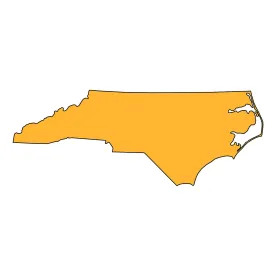North Carolina recently enacted legislation that obligates owners of “utility-scale”¹ solar projects to responsibly decommission their projects upon cessation of operations, and to provide financial assurance for the projected costs of this decommissioning. S.L. 2023-58.
All utility-scale solar project owners must register with the North Carolina Department of Environmental Quality (DEQ) by Nov. 1, 2025, and must comply with the law’s new decommissioning and restoration requirements by and after that date. In addition, by Nov. 1, 2025, any utility-scale solar projects that either (i) have certificate of public convenience and necessity (CPCN) applications that were pending or submitted after June 26, 2023, or (ii) were generating solar energy or interconnected to a transmission facility on June 26, 2023, and that are rebuilt or expanded must submit a decommissioning plan to DEQ for approval as well as establish and maintain financial assurance in an amount approved by DEQ throughout the period of the facility’s operation.
However, solar facilities that are owned or leased by a retail customer intended primarily for the customer’s use or to offset the customer’s consumption at the premises or for net metering are exempt from the new law’s requirements.
Registration Requirements
Each owner of a utility-scale¹ solar project in North Carolina — regardless of the date of construction — must register with DEQ by Nov. 1, 2025, or at least 90 days prior to the commencement of construction of a new utility-scale solar project constructed after that date or commencement of a rebuild² or expansion³ of an existing utility-scale solar project. Registration must be updated every five years. The following information must be included with a project’s registration:
-
The owner and any other legal entity responsible for decommissioning and any financial assurance;
-
Equipment that will be subject to decommissioning, including: (i) the location, size, number, and type of photovoltaic (PV) modules, (ii) identification of any per- and poly-fluoroalkyl substances (PFAS) associated with the project, and (iii) whether the PV modules are likely to be characterized as hazardous waste upon decommissioning;
-
Summary project timeline, including actual or anticipated construction, operation, and service life dates;
-
Cost estimate for decommissioning the project and restoring the project’s real property;
-
Proposal for satisfying any applicable4 financial assurance requirements under the new law; and
-
Copies of previously executed decommissioning plans and/or financial assurance established pursuant to local government ordinance or landowner agreement.
Decommissioning and Restoration Requirements
Beginning Nov. 1, 2025, each owner of a utility-scale¹ solar project in North Carolina — regardless of the date of construction — must comply with the law’s decommissioning and restoration requirements. Proper decommissioning and restoration are required within one year after cessation of operations of a project, and the project owner must notify DEQ within 30 days of cessation of operations. “Cessation of operations” is defined as a failure to produce power for twelve months, except in cases in which a project fails to produce power due to a force majeure event or the owner of the project has legal control of the project’s footprint and has begun rebuilding² the facility.
Decommissioning must include:
-
Disconnecting the solar project from the power grid;
-
Removing all equipment from the solar project — including PV modules, racking, aboveground and subsurface cables and interconnections that are no longer necessary, metal fencing, electrical and electronic devices, and batteries — and either (i) shipping equipment to another project for reuse or recycling components that may be recycled, (ii) properly disposing of components that cannot be reused or recycled and are not hazardous waste in an industrial or municipal solid waste landfill, or (iii) properly disposing of components that meet the definition of a hazardous waste pursuant to hazardous waste recycling and disposal requirements; and
-
Restoring the property to either (i) as near as practicable its condition before the solar project was sited (although land cleared of trees may be revegetated or reforested with seedlings), or (ii) an alternative condition agreed upon in a written contract or lease with the landowner (the agreement must be provided to DEQ), and in either case in compliance with statutory requirements, rules, and local ordinances.
Decommissioning Plan Submission Requirements
Any utility-scale¹ solar project that either (i) had a CPCN application that was pending or submitted after June 26, 2023, or (ii) was generating solar energy or interconnected to a transmission facility on June 26, 2023 and is rebuilt² or expanded³ must submit to DEQ for approval a decommissioning plan that has been prepared and signed by an engineer licensed in North Carolina. The decommissioning plan must be submitted by Nov. 1, 2025, and must include:
-
Project owner and landowner contact information;
-
A narrative description of how decommissioning will be conducted, including sequencing, disposition of materials and delineation of solid and hazardous waste disposal methods, and a schedule for completion;
-
Equipment that will be salvaged, including estimated salvage value of the equipment;
-
Steps that will be taken to comply with the law’s new restoration requirements;
-
Cost estimate for decommissioning the project and restoring the project’s property; and
-
Proposal for satisfying the law’s new financial assurance requirements.
Financial Assurance Requirements
In addition to the decommissioning plan described above, the owner of a utility-scale¹ solar project that either (i) had a CPCN application that was pending or submitted after June 26, 2023, or (ii) was generating solar energy or interconnected to a transmission facility on June 26, 2023, and is rebuilt² or expanded³ must establish and maintain financial assurance in an amount approved by DEQ beginning Nov. 1, 2025. To establish sufficient funds, the owner may use:
insurance, financial tests, third-party guarantees by persons who can pass the financial test, guarantees by corporate parents who can pass the financial test, irrevocable letters of credit, trusts, surety bonds, or any other financial device, or any combination of the foregoing, shown to provide protection equivalent to the financial protection that would be provided by insurance if insurance were the only mechanism used.
G.S. 130A-309.240(d)(1).
Documentation of this financial assurance must be submitted with the project’s DEQ registration or five-year update.
Differing Local and Landowner Requirements
Any contractual provisions executed on or before June 26, 2023, that require decommissioning and/or restoration activities that directly conflict with those set forth in the statute are not abrogated or impaired, including if a landowner has the right to retain project equipment after cessation of operations.
Local governments and landowners may establish requirements that are more stringent than those set forth in the bill for decommissioning and financial assurance for projects in their control.
The law also contains a provision called “Preserving Choices for Consumers” that mirrors legislation and ordinances seen around the United States that seek to prohibit local governmental entities from promulgating gas stove bans, but actually enlarges the sources of energy which are preempted from local government prohibition. It prohibits local governments from banning the sale, purchase, or installation of certain appliances. However, it also prohibits local governments from passing ordinances prohibiting connection, reconnection, modification, or expansion of energy service based on the type or source of energy to be delivered. “Energy service” is defined as energy sources used to illuminate, heat, or cool buildings; produce hot water; operate equipment or appliances, or similar activities, and where the energy source is natural gas, renewable gas, hydrogen, liquified petroleum gas, renewable liquified petroleum gas, or other liquid petroleum products, or electricity generated and distributed by electric suppliers.
Recycling and Reuse of PV Equipment
The law defines “recycling” as “the processing, including disassembling, dismantling, and shredding of PV modules or other equipment from utility-scale solar projects, or their components, to recover a usable product.” It expressly excludes “any process that results in the incineration of such equipment,” and it requires that PV modules determined to be hazardous waste comply with applicable hazardous waste requirements even when recycled.
The North Carolina Department of Commerce must consult with DEQ to identify existing incentives and grant programs to encourage research and development on recycling and reuse of PV modules and grow North Carolina’s PV module recycling and reuse industry.
Agency Rulemaking and Reporting
DEQ must adopt rules to implement the bill, including (i) criteria for the amount of required financial assurance, (ii) requirements for decommissioning plans, and (iii) registration fees. Permanent rules must be adopted by Aug. 1, 2025.
The law also directs the public staff of the North Carolina Utilities Commission to compile a list of all utility-scale solar projects operating in the state as of June 26, 2023, in consultation with DEQ. This list will be reported to the legislature by Jan. 1, 2025, and public staff must provide DEQ with an updated list annually by July 1 of each year.
The new law also contemplates identifying and enforcing existing laws that may allow North Carolina to recover the cost of decommissioning for utility-scale solar projects otherwise currently exempt from financial assurance requirements. By Jan. 1, 2025, public staff must identify and report to the legislature any laws that do not require ratepayer contribution or governmental appropriations and that would enable recovery of the cost of decommissioning for utility-scale solar projects that are not subject to a financial assurance requirement under the new law, a local requirement, or a lease or other contract.
DEQ will include information regarding implementation of the bill and the management of solar energy equipment as part of its annual report on solid waste management efforts to the Environmental Review Commission and the Fiscal Research Division. DEQ will also provide quarterly reports on implementation of the bill to the Environmental Review Commission and the Joint Legislative Commission on Energy Policy beginning Dec. 1, 2023, through Dec. 1, 2025.
¹ “Utility-scale” is defined as a ground-mounted PV, concentrating PV, or concentrating solar power project capable of generating 2 MW AC or more directly connected to the grid with the ability to deliver power to the grid. It includes solar arrays, accessory buildings, battery storage facilities, transmission facilities, and other infrastructure necessary for operation of the project. It does not include facilities owned or leased by a retail customer intended primarily for the customer’s use or to offset the customer’s consumption at the premises or for net metering.
² “Rebuilt” is defined as more than 50% of the original photovoltaic modules have been replaced with a different type of module or other fuel source, and the project is deemed to be new for income tax purposes.
³ “Expanded” is defined as adding 2 MW AC or more of directly connected solar energy generating capacity to the local or regional grid with the ability to deliver power to the grid, or increasing the ability of the project to deliver power to the grid by 35%, whichever is larger.
4 Although all utility-scale¹ solar projects must register with DEQ, as discussed below not all projects will be subject to the new financial assurance requirements.





 />i
/>i
